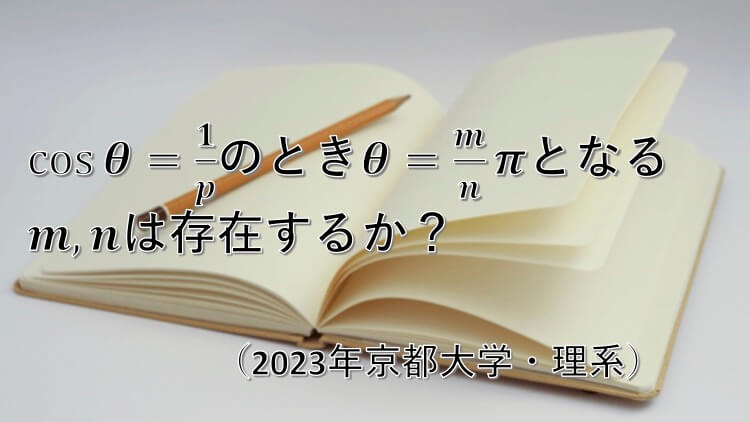\( p \) を \(3\) 以上の素数とする。また、\(\theta\) を実数とする。
(1)\(\cos 3\theta \) と \( \cos 4\theta\) を \(\cos \theta\) の式として表せ。
(2)\(\displaystyle \cos \theta = \frac{1}{p}\) のとき、\(\displaystyle \theta = \frac{m}{n}\cdot\pi \) となるような正の整数 \(m,n \) が存在するか否かを理由を付けて判定せよ。
【解説】
(1)は三角比の和積の公式を使うと便利です。
(2)は何だが難しいですね。。。まず、\( \cos n\theta \) が \(\cos\theta\) の \(n\) 乗の式で表せることに着目します。(1)の誘導からも類推できます。ここから \( \cos n\theta \) が \( \displaystyle \frac{1}{p}\) の\(n\) 乗の式で表せることがわかります。
次に \( \displaystyle \theta=\frac{m}{n}\pi \) から \( \cos n\theta = \cos m\pi = \pm1 \) となります。このあたりを組み合わせ、両方を満たす整数 \(m,n\) が存在し得るのかを考えます。
【解答】
(1)
\begin{equation}
\begin{array}{l}
\cos3\theta + \cos\theta = 2\cos2 \theta \cos\theta \\[5pt]
∴\cos 3\theta = 2\cos2\theta\cos\theta – \cos\theta \\
\hspace{8pt} = 2(2\cos^{2}\theta-1)\cos\theta – \cos\theta \\
\hspace{8pt} = 4\cos^{3}\theta – 3\cos\theta \cdots (答) \\[10pt]
\cos4\theta + \cos2\theta = 2\cos3\theta \cos\theta \\[5pt]
∴\cos4\theta = 2\cos3\theta\cos\theta – \cos2\theta \\
\hspace{8pt} = 2(4\cos^{3}\theta – 3\cos\theta)\cos\theta – ( 2\cos^{2}-1 ) \\
\hspace{8pt} = 8\cos^{4}\theta – 8\cos^{2}\theta +1 \cdots (答) \\
\end{array}
\end{equation}
(2)\(p\):\(3\)以上の整数、\(m,n\)は正の整数に対して、
\begin{equation}
\cos\theta=\frac{1}{p}, \theta=\frac{m}{n}\pi \cdots ①
\end{equation}
が成り立つとする。①より
\begin{eqnarray}
\cos n\theta & = \cos m \pi \\
\cos n\theta &= \pm1 \cdots ②
\end{eqnarray}
次に \(\cos n\theta \) が \(\cos \theta \) の \(n\) 次式で表せ、\(\cos\theta\) の \(n\) 乗の係数が \(2^{n-1}\) 、他のすべての係数が整数となることを示す。
\begin{equation}
\cos n\theta = f_n (\cos\theta) \cdots (*)
\end{equation}
i) \(n=1,2\) のとき
\begin{eqnarray}
\cos \theta & =& f_1 = \cos\theta \\
\cos 2\theta &=& f_2 = 2\cos^{2}\theta-1 \\
\end{eqnarray}
となり、(*)は成り立つ。
ii) \(n=k,k+1\) のとき(*)が成り立つと仮定する。
\begin{eqnarray}
\cos (k+2)\theta + \cos k\theta &=& 2\cos(k+1)\theta \cos\theta \\[5pt]
∴\cos (k+2)\theta &=& 2\cos(k+1)\theta \cos\theta – \cos k\theta \\
f_{k+2}(\cos\theta) &=& 2 f_{k+1}(\cos\theta) \cos \theta -f_k(\cos\theta) \\
\end{eqnarray}
上記式から \(\cos\theta\) の \(k+2\) 乗は \( 2\times 2^k=2^{k+1} \) を係数にもつ。よって(*)は \(n=k+2\) のときも成り立つ。
i)、ii)より数学的帰納法により、\(n\ge1\) で(*)は成り立つ。
ここで①②より
\begin{equation}
f_n \left( \frac{1}{p} \right) = \pm1 \\
2^{n-1}\frac{1}{p^n} + a_{n-1}\frac{1}{p^{n-1}} + \cdots + a_1\frac{1}{p} + a_0 = \pm1 \\
(ただし、a_kは整数)\\
\end{equation}
両辺に \(p^{n-1}\) をかけると
\begin{equation}
\frac{2^{n-1}}{p} + a_{n-1} + a_{n-2} \cdot p + \cdots + a_1 \cdot p^{n-2} + a_0 \cdot p^{n-1} = \pm p^{n-1}
\end{equation}
右辺は整数だから \(\displaystyle \frac{2^{n-1}}{p}\) も整数となるが、\(p\) は \(3\) 以上の素数だから矛盾する。
以上より、①②を満たす正の整数 \(m,n\) は存在しない。


